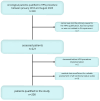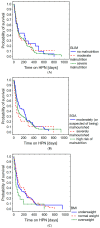Nutritional Status as a Prognostic Factor for Survival in Palliative Care: A Retrospective Observational Analysis of Home Parenteral Nutrition in Cancer Patients with Inoperable Malignant Bowel Obstruction
- PMID: 38892502
- PMCID: PMC11174551
- DOI: 10.3390/nu16111569
Nutritional Status as a Prognostic Factor for Survival in Palliative Care: A Retrospective Observational Analysis of Home Parenteral Nutrition in Cancer Patients with Inoperable Malignant Bowel Obstruction
Abstract
Palliative care patients with malignant bowel obstruction are particularly at risk of developing malnutrition, which in turn directly shortens survival time and worsens quality of life (QoL). According to the available data, the survival time in this patient group is often less than three months. To avoid further complications related to malnutrition and poor outcomes in oncological therapy, nutritional therapy such as home parenteral nutrition (HPN) is offered. The aim of this study was to investigate whether nutritional status is a prognostic factor for survival in palliative care patients with malignant inoperable bowel obstruction qualified for home parenteral nutrition and which nutritional assessment tool has the most accurate prognostic value. This retrospective observational analysis included 200 patients with malignant bowel obstruction referred for home parenteral nutrition between January 2018 and August 2023. The analysis included laboratory test results, body mass index (BMI), Subjective Global Assessment (SGA), Nutritional Risk Index (NRI), Geriatric Nutritional Risk Index (GNRI), Prognostic Nutritional Index (PNI) and malnutrition as defined by the Global Leadership Initiative on Malnutrition (GLIM). The average survival time of the patients was 75 days. Patients with higher NRI and PNI scores were more likely to survive (NRI: p < 0.001; PNI: p < 0.001). The GLIM criteria, SGA scores and BMI values did not prove to be good prognostic factors for survival (GLIM p = 0.922, SGA p = 0.083, BMI p = 0.092). The results suggest that the use of NRI and PNI may be helpful in prognosing survival in these patients and that prevention of the development of malnutrition through earlier nutritional assessment and intervention should be considered in this patient group.
Keywords: home parenteral nutrition; malignant inoperable bowel obstruction; malnutrition; palliative care patients; survival time.
Conflict of interest statement
The authors declare no conflicts of interest.
Figures






Similar articles
-
Efficacy of the Nutritional Risk Index, Geriatric Nutritional Risk Index, BMI, and GLIM-Defined Malnutrition in Predicting Survival of Patients with Head and Neck Cancer Patients Qualified for Home Enteral Nutrition.Nutrients. 2022 Mar 17;14(6):1268. doi: 10.3390/nu14061268. Nutrients. 2022. PMID: 35334925 Free PMC article.
-
Crohn's Disease Patients Referred for Home Parenteral Nutrition-A Comprehensive Analysis of 18 Years' Experience at a National Reference Centre.Nutrients. 2025 May 16;17(10):1697. doi: 10.3390/nu17101697. Nutrients. 2025. PMID: 40431437 Free PMC article.
-
Palliative home parenteral nutrition in patients with ovarian cancer and malignant bowel obstruction: experiences of women and family caregivers.BMC Palliat Care. 2019 Dec 29;18(1):120. doi: 10.1186/s12904-019-0507-5. BMC Palliat Care. 2019. PMID: 31884962 Free PMC article.
-
The role of parenteral nutrition in patients with malignant bowel obstruction.Support Care Cancer. 2019 Dec;27(12):4393-4399. doi: 10.1007/s00520-019-04948-1. Epub 2019 Jul 17. Support Care Cancer. 2019. PMID: 31317258 Review.
-
The Impact of Home Parenteral Nutrition on Survival and Quality of Life in Patients with Intestinal Failure and Advanced Cancer: A Comprehensive Review.Nutrients. 2025 Mar 5;17(5):905. doi: 10.3390/nu17050905. Nutrients. 2025. PMID: 40077775 Free PMC article. Review.
Cited by
-
Comparing GLIM and SGA Nutritional Criteria for Malnutrition Assessment and Prognosis in Chronic Heart Failure Patients.Int J Gen Med. 2025 Mar 25;18:1669-1679. doi: 10.2147/IJGM.S514143. eCollection 2025. Int J Gen Med. 2025. PMID: 40161454 Free PMC article.
References
Publication types
MeSH terms
LinkOut - more resources
Full Text Sources
Medical

